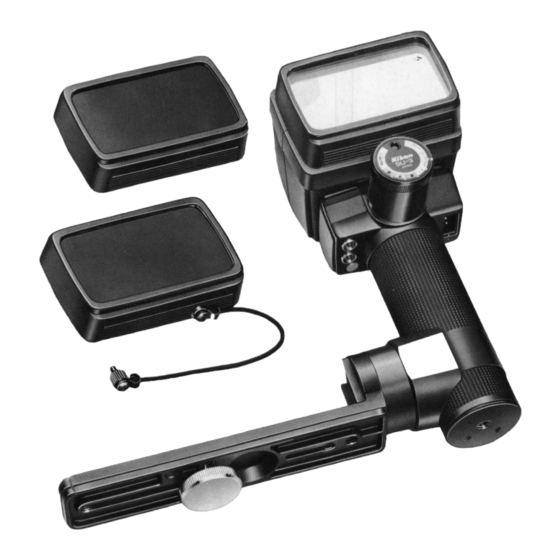Nikon SB-140 Manuale di istruzioni - Pagina 34
Sfoglia online o scarica il pdf Manuale di istruzioni per Camera Flash Nikon SB-140. Nikon SB-140 39.

OPTIMUM BATTERY PERFORMANCE
34
1.
New batteries
Between manufacture
and
first use
,
all batteries
exhibit
some
drain.
Therefore,
care
should
be taken
to purchase the newest
(and freshest) ones
pos-
sible.
To help
you
do this
,
some
manufacturers
stamp the
date of manufacture on
the bottom of
each
battery. Ask
your
camera dealer
for assistance
in
interpreting
the
codes.
2.
Temperature
Battery life ratings
are
based
on
operation
at around
20°C (68°F).
At other
temperatures,
battery life is
shortened.
Spare batteries
should
therefore
be kept
available
if
operation in
low temperatures
in antici-
pated.
3.
Continuous use
Batteries are drained much more quickly
by con-
tinuous use then by intermittent
use.
4.
Storage
When
not in
use,
the
batteries
should be removed
from the power
supply
to prevent leakage
which
may damage the unit. To minimize drain during
the
period of
disuse,
store
the batteries in
a cool
,
dry
place below
20°C (68°F).
5.
Battery brands
Do not mix
brands of
batteries
or use
batteries
with
different model
numbers.
Also,
avoid mixing new
and
old batteries
since
proper performance
will not
be obtained and battery leakage may
occur.
6.
Disposal
Do
not
dispose
of
batteries
by burning
.
Al
so,
for
safety's sake,
never disassemble
batteries
.
7.
Polarity
When
installing
batteries,
observe the voltage
polar-
ities carefu lly.
Reversal of the positive
(+)
and nega-
tive
(-
)
terminal
s
will
result
in
leakage
.
If
leakage
should
occur,
clean the SB -140 carefully or take it to
an authorized Nikon dealer or service
c
enter.
8.
NiCd batteries
In
comparison with regular
batteries,
NiCd
batteries
provide
faster
recycling
and
higher
efficiency at
low
temperatures. However,
the
recycling time and the
number of flashes per
battery set depend
upon
the
age of
the
batteries,
their
charges,
and
their
capacities.
o
Do not
continue
to use NiCd batteries
after they are
exhausted.
Continued use may reduce their life span
or
cause leakage.
o
Before
cha
rging, thoroughly read the battery
and
battery
charger
instructions.
o
Charging should only be done
for the designated
number of hours
on
a
battery charger recommended by the battery
manufacturer.
Excessive
charging may cause battery
detefloration.
o
Charging should only be done in
temperatures
between
SOC
141°F) and
3SoC
19S0F).
Never
charge batteries while they are still
hot
from
use.
o
Never attempt
to
charge
NiCd
batteries that are incorrectly
installed in
the battery
charger.
o
The charging capacity
of
NiCd batteries
may be shortened after
a
long period
of
storage.
If
this
occurs,
discharge and recharge them
several times.
o
if
working
time
is markedly
reduced
even after they have been
correctly
charged,
replace
them
with
a
fresh
set.
o
Do not mix new and old NiCd
batteries.
•
Do not use
NiCd
batteries
which
have been charged for different
lengths of
time.
